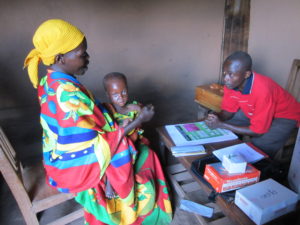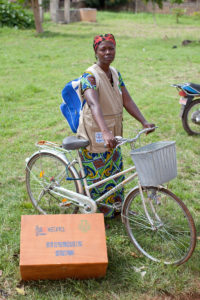Accounting for more than one million under-five deaths each year, pneumonia is the leading killer of children under the age of five worldwide, claiming more lives than AIDS, malaria, and tuberculosis combined. This year’s World Pneumonia Day (WPD) theme is “universal access to pneumonia prevention and care”. In commemoration of WPD, child health advocates are calling for pneumonia control through proven interventions that protect against, prevent, and treat pneumonia. Through our work in community case management (CCM) and expanding access to amoxicillin, the USAID-funded Systems for Improved Access to Pharmaceuticals and Services (SIAPS) Program uses a systems-strengthening approach to expand universal access to pneumonia prevention and care. 
One of the most significant changes in pneumonia treatment guidelines is the WHO recommendation to use dispersible amoxicillin tablets as first-line treatment in 2012. This year, the WHO recommended a change in treatment protocol from two to three bands for treatment with amoxicillin at the facility level. Management of pneumonia at the community level, however, continues to be with the simpler regimen of amoxicillin. As a key member of the Diarrhea and Pneumonia Working Group under the UN Commission of Life Saving Commodities for Women and Children, SIAPS participated in these discussions, supporting the global activities and developed advocacy documents for use of amoxicillin for pneumonia treatment as well as worked closely with PATH to develop job aids for dispensing amoxicillin dispersible tablets.

SIAPS further contributes to the fight against childhood pneumonia by ensuring that best practices are incorporated in global policies as well as in country-level implementation of CCM. At the global level, SIAPS participates in the Community Case Management Task Force and its Supply Chain Management subgroup providing global technical guidance on CCM through resources and webinars. SIAPS works towards bringing these low-cost, lifesaving commodities to the rural, poor, and marginalized children most at risk of pneumonia through training, supervising and monitoring community health workers. At the country level, SIAPS supports the adoption of the WHO treatment recommendations and implementation of best practices in CCM to reduce child deaths from pneumonia and other illnesses, as well as supporting the national planning and coordination mechanisms. For example, in Guinea, SIAPS guided the Ministry of Health in the adoption of WHO policy in their national CCM protocols, the design of the CCM supply chain system and in the quantification of CCM commodities including amoxicillin, during the first phase of implementation of CCM. In Mali, SIAPS also worked to incorporate the community level in the country’s logistics management information system in order to bring visibility to availability of key CCM commodities, including amoxicillin, and to expand access.
The CCM approach to reach more children with symptoms of pneumonia combined with the improved management at the facility level should reduce referrals for hospitalization, and achieve better treatment outcomes. Along with overall health systems strengthening and renewed global commitment, SIAPS’s pharmaceutical system strengthening approach can ensure equitable access to the lifesaving medicines necessary to save children from pneumonia worldwide.

